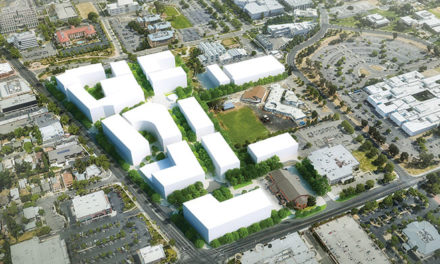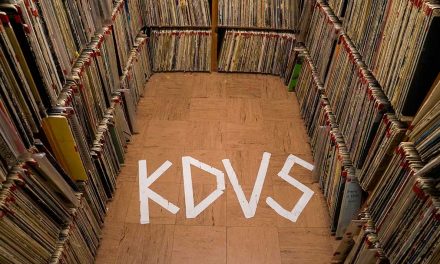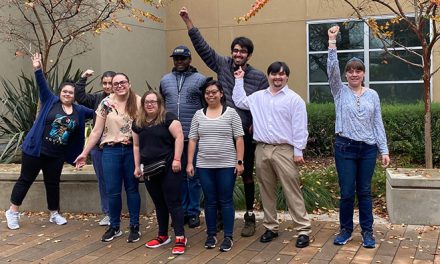Moonshot Thinking
Photo: Firefly Aerospace
Firefly Aerospace is going to space with the help of two UC Davis alumni.
Cedar Park, Texas-based Firefly is aimed at developing launch vehicles. The company is preparing for a rocket launch later this year and a moon landing in 2023. It’s part of a push among private companies to bring people and payload to space.
Firefly’s Alpha rocket features work by Roderic Vanderscoff ’14, stage 1 lead propulsion engineer, and Bethany Baldwin-Pulcini ’15, systems engineer. The rocket is designed to launch 1,000 kilograms of payload to a low Earth orbit, addressing the needs of a burgeoning small-satellite market.
“As a kid I was always fascinated about space,” Vanderscoff said, “so in a lot of ways, it’s been a dream come true to be able to work on launching a rocket into space.”
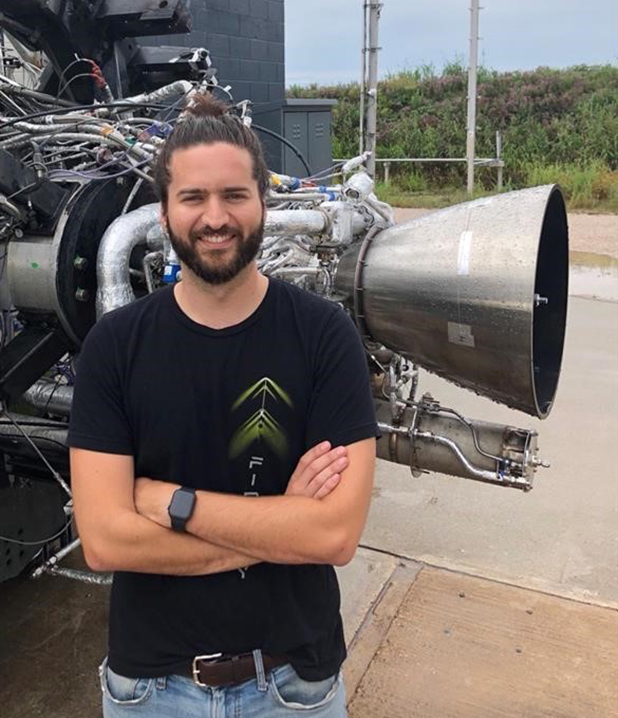
Roderic Vanderscoff ’14 is a stage 1 lead propulsion engineer at Firefly Aerospace. (Courtesy of Roderic Vanderscoff)
On the Job
For Alpha, Vanderscoff leads design, development and testing of the booster rocket engine.
“The engine’s job is to essentially provide all the thrust to lift the rocket off the ground and up into orbit,” he said. “There’s a lot of interesting and fun challenges for that.”
For example, he added, a sliver of metal separates the combustion gasses inside the engine that’s over 6,000 degrees Fahrenheit and cryogenic oxygen, which is around -300 degrees.
Testing has been vital — and exciting, Vanderscoff said.
“Every time I ever do an engine test, my heart always beats really fast,” he said. “When it goes great, it’s such a fantastic thing to see, hear and feel even though we’re over 100 yards away.”
For her part in Alpha, Baldwin-Pulcini has been dedicated to the flight termination system.
“I never really thought about this until I was in the ‘rocket biz,’ but there are a lot of safety systems that go into rocket flights,” she said. “One of the big ones is that if your launch range, in our case Vandenberg Air Force Base, deems your rocket endangering to the population, they are within their rights to blow it up for you.”
Of course, she added, that would mean the end of the mission.
“Anyone who builds a rocket hopes their flight termination system never has to be used,” she said. “It’s just exciting to know that what you’re working on is so critical to even being allowed to launch the rocket.”
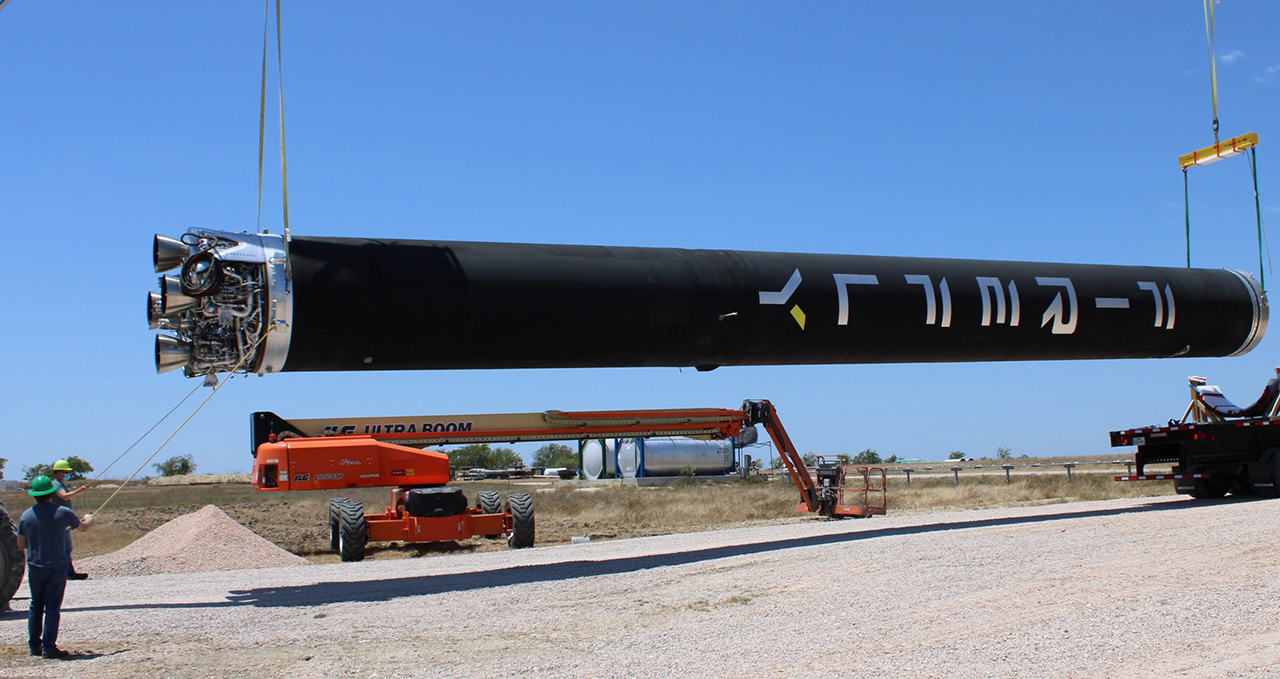
The first Alpha rocket launch is planned for later this year.
Photo courtesy of Firefly Aerospace
Baldwin-Pulcini is also part of the Blue Ghost lunar lander project. In February, NASA awarded Firefly $93.3 million to deliver a suite of 10 science investigations and technology demonstrations to the moon in 2023. The investigations, NASA said, will help prepare for human missions to the lunar surface.
For this project, Baldwin-Pulcini is part of the systems engineering team facilitating all the work on multiple teams.
“Systems engineers are there to make sure we’re all building the right thing,” she said. “It’s a cross-functional team where I’m working with engineers that are building the software, the electronics, the structures, and all of this needs to be able to come together for a successful mission.”
A passion for space
Vanderscoff and Baldwin-Pulcini both studied physics and astrophysics at UC Davis. They took classes together as undergraduates and said their shared passion for space led to working together at Firefly.
Like Vanderscoff, Baldwin-Pulcini had an interest in the cosmos at a young age.
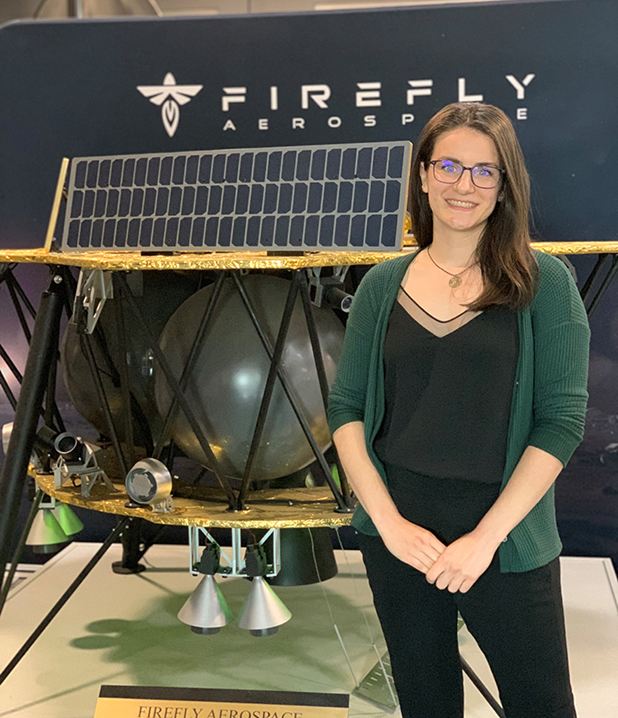
Bethany Baldwin-Pulcini ’15, systems engineer, is currently focused on the 2023 lunar landing project at Firefly Aerospace. (Courtesy of Bethany Baldwin-Pulcini)
“I was always into understanding what’s going on out there in the universe,” Baldwin-Pulcini said. “I think I was 6 years old when I got a discovery book that told me a day was 4 minutes shorter than 24 hours. I annoyed everybody telling them that the Earth only rotates every 23 hours and 56 minutes and 4.2 seconds. I was that kid.”
As a transfer student, she arrived at UC Davis from community college knowing what she wanted to study. Her senior year, she said she told her professors about her desire to find hands-on work in space exploration.
Vanderscoff arrived as a freshman with a keen interest in space and landed on physics as a major. He also did some research in the College of Engineering, before pursuing a Master of Science degree in astronautical engineering from University of Southern California.
“My time at UC Davis fostered my curiosity in space and provided me the tools and access for me to chase my dream on exploring our solar system,” he said.
Now, as Firefly aims to increase access to space, the Alpha launch could get new generations inspired by the galaxy. The maiden launch includes the “dream payload” — cargo space for educational institutions in the U.S. and around the world.
“My cousin’s son drew on a piece of paper that will get sent into space,” Vanderscoff said. “The opportunities are so bountiful when more and more people can get excited by space.”


